
Seventeen cross-disciplinary projects involving 153 faculty from all 10 Vanderbilt colleges and schools have been selected for the initial set of awards from the new Trans-Institutional Program (TIPs) initiative. The projects represent a broad range of research and teaching, with diverse topics such as preventing adverse pregnancy outcomes and prematurity, big data infrastructure, and private governance approaches to climate change.
Chancellor Nicholas S. Zeppos launched the $50 million TIPs program in November 2014 to provide support over the next five years for cross-disciplinary research and collaboration—a core pillar of the university’s Academic Strategic Plan. The 17 projects were selected from 64 formal proposals received.
“[rquote]These projects represent exactly the kind of innovation, collaboration and willingness to tackle society’s most pressing questions that we as a university community envisioned during the strategic planning process,”[/rquote] Zeppos said. “In these proposals, our faculty brought their passion and creativity to bear to integrate research, education and outreach in a way that aligns with our ambitions to shape the future of higher education and create world-changing knowledge. I cannot wait to see what they accomplish.”
TIPs are cross-college initiatives involving partnerships that interweave diverse perspectives, features, methods and information to foster creativity in both discovery and learning. The funds for the first round of projects will be available July 1.
The TIPs Council, appointed by Zeppos and co-chaired by John Geer, vice provost for academic and strategic affairs, interim dean of the Graduate School and Gertrude Conaway Vanderbilt Professor of Political Science, and Larry Marnett, associate vice chancellor for research and University Professor of Biochemistry and Chemistry, evaluated all proposals and made final recommendations on those to receive funding. The next TIPs process will begin early next semester.
“Narrowing down the 64 inspiring proposals we received to these 17 was a daunting task, and I am grateful to the TIPs Council and its chairs, John Geer and Larry Marnett, for their dedication to this effort,” Susan Wente, provost and vice chancellor for academic affairs, said. “Collaboration and collegiality are two of the primary reasons we consistently attract the best faculty, students and staff to Vanderbilt. This program further supports our investment in that One Vanderbilt advantage.”
TIPs applicants were encouraged to identify projects that only could be pursued through collaboration and that still may be in the “incubation” phase. There was also an opportunity for existing initiatives to apply for funding that would allow these enterprises a chance to make even greater strides. While most funded proposals were new ideas, the TIPs process did make some strategic re-investments.
“These proposals are innovative, they are timely, and they all contain an element of risk and uncertainty, which were exactly our aims when we created this program,” Jeff Balser, vice chancellor for health affairs and dean of the School of Medicine, said. “By taking chances and working together, we have positioned the university to move quickly and nimbly to take advantage of opportunities as they become available. I am highly optimistic that these collaborations will continue to transform our understanding of health care and our world.”
The TIPS Council will host workshops prior to next year’s submission deadline for faculty seeking guidance on proposal development. A “Tips for TIPS” document outlining best practices for proposal writing also will be shared.
The inaugural TIPs programs and the schools represented by their participants are below. Download the full listing, which includes project descriptions and collaborating faculty.
Advanced Neuroimaging at Vanderbilt
College of Arts and Science, School of Engineering, School of Medicine
The Vanderbilt Pre3 Initiative (Preventing Adverse Pregnancy Outcomes and Prematurity)
School of Medicine, Peabody College, School of Engineering
A Trans-institutional Big Data Architecture at Vanderbilt
College of Arts and Science, Jean and Alexander Heard Library System, Peabody College, School of Engineering, School of Medicine
Program for Bioeffector Discovery
College of Arts and Science, School of Medicine
Vanderbilt Institute for Obesity and Metabolism
College of Arts and Science, School of Law, Peabody College, Owen Graduate School of Management, School of Medicine
ViSE – Bringing Engineers and Surgeons Together
School of Engineering, School of Medicine
The Science of Music Research: Creating a Program for Music, Mind and Society
Blair School, College of Arts and Science, Peabody College, School of Engineering, School of Medicine
NetsBlox: Digital Learning Technology for Computer Science Education
College of Arts and Science, Peabody College, School of Engineering
Trans-Institutional Collaborative to Improve Chronic Disease in Children and Their Families in Underserved Settings
Peabody College, School of Medicine
A Multidisciplinary Approach to Assessing Health Care in Brazil
College of Arts and Science, Owen Graduate School of Management, School of Medicine
Sterling Ranch–Sustainability and Education Research Center
College of Arts and Science, Peabody College, School of Engineering
Ethics of Health and Human Flourishing
College of Arts and Science, Dean of Students, Peabody College, School of Medicine
Learning Institute for Health Solutions in the U.S. South
College of Arts and Science, Divinity School, School of Medicine, School of Nursing
Vanderbilt Center for Molecular Probes
College of Arts and Science, School of Engineering, School of Medicine
Wisdom Working Group
College of Arts and Science, School of Law, Peabody College, School of Engineering, School of Medicine
Private Governance Approaches to Climate Change
College of Arts and Science, Owen Graduate School of Management, School of Law
The Laboratories for Innovation in Global Health Technologies (LIGHT)
College of Arts and Science, School of Engineering, School of Medicine
A full listing of all participants is available on the TIPs section of the Office of the Provost’s website.